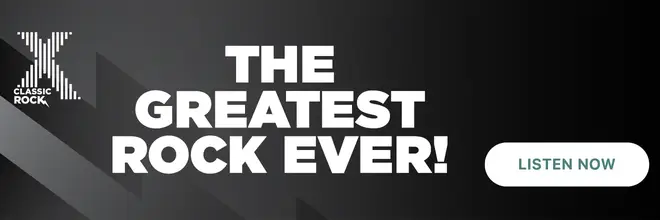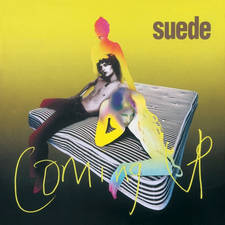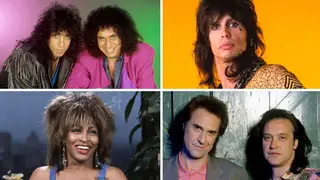The 25 greatest Classic Rock solo albums
30 May 2024, 11:16 | Updated: 6 June 2024, 10:51

Solo albums can often allow an artist to express themselves freely, without the constraints and conflict of a group. Here are some of the most notable Classic Rock solo LPs.
Listen to this article
Turn up Radio X Classic Rock on Global Player here- dedicated to the greatest classic rock music of all time

-
Janis Joplin - I Got Dem Ol' Kozmic Blues Again Mama! Release date 11th September 1969
Joplin played her final show with Big Brother & The Holding Company in San Francisco on 1st December 1968 and then went on to forge a solo career with her new group, the Kozmic Blues Band. Her solo debut included a cover of the Bee Gees' To Love Somebody and Try (Just A Little Bit Harder). Her second and final solo album, Pearl, would be released three months after her untimely death on 4th October 1970.
Janis Joplin - I Got Dem Ol' Kozmic Blues Again Mama! Picture: Alamy -
Paul McCartney - McCartney: release date 17th April 1970
Macca's first solo album was overshadowed somewhat by the accompanying press release which effectively ended The Beatles. Paul had claimed he'd left the band and recorded this first outing mainly at home. Tracks included That Would Be Something, Every Night, a couple of unused Beatles-era tunes in Junk and Teddy Boy and the epic Maybe I'm Amazed.
Paul McCartney - McCartney album cover art. Picture: Alamy -
George Harrison - All Things Must Pass: release date 27th November 1970
The "Quiet One" amazed the world with his first solo effort, which was a triple album that featured a lot of songs that had been rejected by The Beatles. Tracks included the Bob Dylan co-written I'd Have You Anytime, the hit My Sweet Lord and the epic Isn't It A Pity.
George Harrison - All Things Must Pass cover art. Picture: Alamy -
John Lennon - Imagine: release date 8th October 1971 (UK)
The ex-Beatle's second (proper) solo album was a softer affair than the previous Plastic Ono Band "primal scream" outing and included the famous title track, plus Jealous Guy and the McCartney-baiting How Do You Sleep?
John Lennon - Imagine cover art. Picture: Alamy -
Pete Townshend - Who Came First: released October 1972
The Who guitarist had issued two albums dedicated to his guru Mehr Baba at the turn of the 1970s, but this was his first real solo album, which included material that was due to appear as part of the band's Lifehouse project. When that morphed into the LP Who's Next, Townshend released some of the demos on this LP, including Pure And Easy and Let's See Action.
Pete Townshend - Who Came First cover art. Picture: Alamy -
Lou Reed – Transformer: release date 8th November 1972
Reed's second solo album after leaving The Velvet Underground included two of his most enduring songs: Walk On The Wild Side, Satellite Of Love and Perfect Day.
Lou Reed – Transformer album cover. Picture: Alamy -
Brian Eno - Here Come The Warm Jets: release date 8th February 1974
After Bryan Ferry told Brian Eno that they would never share the same stage again in June 1973, the musician immediately left Roxy Music and recorded an experimental album with guitarist Robert Fripp, titled No Pussyfooting. Eno's first solo album appeared the following year, with contributions from Fripp, former Roxy colleagues Andy Mackay, Phil Manzanera and Paul Thompson, Hawkwind's Simon King, John Wetton of King Crimson and many more.
Brian Eno - Here Come The Warm Jets cover art. Picture: Alamy -
Bryan Ferry - Let's Stick Together: release date 10th September 1976
After two albums of covers (These Foolish Things and Another Time Anothe Place), Ferry issued this solo collection following Roxy Music's hiatus in 1976. The singer remade some Roxy classics 2HB and Re-Make/Re-Model, as well as covering Gallagher & Lyle's Heart On My Sleeve and Wilbert Harrison's Let's Stick Together, which made Number 4 in the UK.
Bryan Ferry - Let's Stick Together vinyl. Picture: Alamy -
Dennis Wilson - Pacific Ocean Blue: release date 22nd August 1977
The Beach Boys drummer had been stockpiling songs for a solo album since the beginning of the 1970s, but while the resulting LP Pacific Ocean Blue had some decent reviews, it only had modest commercial success. Since Wilson's death in 1983, the record has gained critical acclaim, particularly the tracks You And I and River Song.
Dennis Wilson - Pacific Ocean Blue cover art. Picture: Press -
Iggy Pop - Lust For Life: release date 9th September 1977
Both David Bowie and Iggy Pop were hugely productive once they’d moved to Berlin and released two albums each in ’77. The Igster’s second outing this year was his most popular, spawning the raucous title track, The Passenger and another track Bowie would later cover: Tonight.
Iggy Pop Lust for Life cover art. Picture: Alamy -
Gary Moore - Back On The Streets: release date September 1978
Between leaving the Irish blues rock band Skid Row and joining Thin Lizzy in 1973, guitarist Moore recorded an album with his own eponymous band, titled Grinding Stone, but Back On The Streets marked the beginning of the musician's solo career in earnest. His debut album included a version of Lizzy's Don't Believe A Word and the UK hit Parisienne Walkways, co-written with Phil Lynott.
Gary Moore - Back On The Streets cover art. Picture: Press -
Peter Gabriel - Peter Gabriel III: released 30th May 1980
Aka "the one with the melty face", the former Genesis man's third self-titled solo album included the hit Games Without Frontiers and the moving Biko, which rails against the death of the anti-apartheid activist Stephen Biko at the hands of South African polcie in 1977.
Peter Gabriel III. Picture: Alamy -
Stevie Nicks - Bella Donna: release date 27th July 1981
The Fleetwood Mac star's debut solo album included the singles Edge Of Seventeen and Leather And Lace and appeared between the band's albums Tusk and Mirage.
Stevie Nicks - Bella Donna cover art. Picture: Alamy -
Phil Collins - Face Value: released 13th February 1981
Taking time out from being a full time member of Genesis, Phil's debut solo album included the epic single In The Air Tonight and If Leaving Me Is Easy.
Phil Collins - Face Value cover art. Picture: Alamy -
Donald Fagen - The Nightfly: release date 1st October 1982
The recording of Steely Dan's Gaucho in 1980 had caused Donald Fagen and Walter Becker to pause their songwriting partnership, leading Fagen to go solo with this acclaimed album that featured I.G.Y., Ruby Baby and New Frontier.
Donald Fagen - The Nightfly cover art. Picture: Alamy -
Dio - Holy Diver: release date 25th May 1983
After leaving Black Sabbath, Ronnie James Dio formed Dio with his colleague Vinny Appice and his debut album had hits with the title track and the song Rainbow In The Dark.
Dio - Holy Diver cover art. Picture: Alamy -
Robert Plant - The Principle Of Moments
"Percy" Plant's first solo outings were actually pre-Led Zeppelin, but following the demise of the legendary rock band, he went solo in 1982 with the album Pictures At Eleven. The follow-up, 1983's The Principle Of Moments included the hit Big Log, plus Other Arms and In The Mood.
Robert Plant - The Principle Of The Moments cover art. Picture: Alamy -
Ozzy Osbourne - Bark At The Moon: release date 18th November 1983
Following 1981's Diary Of A Madman and 1982's Speak Of The Devil, Ozzy's third solo album after being fired from Black Sabbath saw the singer embrace a more commercial sound, with both the title track and So Tired becoming hits thanks to their memorable videos.
Ozzy Osbourne - Bark At The Moon cover art. Picture: Alamy -
David Gilmour - About Face: release date 5th March 1984
Both Gilmour and Rick Wright had made solo albums in 1978, while Pink Floyd was still a going concern, but it was his post-Floyd LP that gained all the attention, with tracks like Love On The Air (with lyrics by Pete Townshend) and Blue Light, plus guest appearances from Steve Winwood and Jon Lord of Deep Purple.
David Gilmour - About Face cover art. Picture: Alamy -
Roger Waters - The Pros And Cons Of Hitch Hiking: release date 30th April 1984
After Waters called time on Pink Floyd following 1983's The Final Cut, he went solo with this concept album about a midlife crisis that included the single Every Stranger's Eyes. His next album, Radio KAOS, would go head to head with David Gilmour and Nick Mason's revival of the Floyd name with A Momentary Lapse Of Reason.
Roger Waters The Pros and Cons of Hitch Hiking CD. Picture: Alamy -
Don Henley - Building The Perfect Beast: release date 19th November 1984
The former Eagles man's second solo album included his huge hit The Boys Of Summer, plus the singles Sunset Grill, Not Enough Love In The World and All She Wants To Do Is Dance.
Don Henley - Building The Perfect Beast cover art. Picture: Press -
Sting - The Dream Of The Blue Turtles: release date 17th June 1985
The former Police frontman had been using the band as a vehicle for his pop singwriting in their latter years and had made the occasional live appearance without Andy Summers and Stewart Copeland. Following a chart hit with Spread A Little Happiness from the soundtrack to Brimstone And Treacle in 1982, Sting finally kicked off his solo career in 1985 with this hugely successful album that spawned the singles Love Is The Seventh Wave, Fortress Around Your Heart, Russians and If You Love Somebody Set Them Free.
Sting - The Dream Of The Blue Turtles album cover. Picture: Alamy -
Paul Simon - Graceland: release date 25th August 1986
After making his name as one half of Simon & Garfunkel, Paul Simon embarked on an excellent solo career, which peaked with this 1986 album that tapped into the music of South Africa. Hits included You Can Call Me Al, The Boy In The Bubble, Diamonds On The Soles Of Her Shoes and the blissful title track.
Paul Simon - Graceland album cover art. Picture: Alamy -
David Lee Roth - Eat 'Em And Smile: release date 7th July 1986
At the peak of Van Halen's success, singer Roth decided to jump ship and build his own band around ace guitarist Steve Vai, bassist Billy Sheehan and drummer Gregg Bissonette. Singles included Yankee Rose, Goin' Crazy, I'm Easy and a cover of the Frank Sinatra standard That's Life.
David Lee Roth - Eat 'Em And Smile album cover. Picture: Alamy -
Keith Richards - Talk Is Cheap: release date 3rd October 1988
It wasn't until the Stones went on a hiatus after their underwhelming Dirty Work album that Keef decided to attempt a solo LP. Stones men Mick Taylor and saxphone player Bobby Keys make appearances, as does Bootsy Collins. Tunes include Take It So Hard, Struggle and You Don't Move Me, reputedly a bitter rant about his old colleague Mr Jagger.
Keith Richards - Talk Is Cheap album cover. Picture: Alamy


































